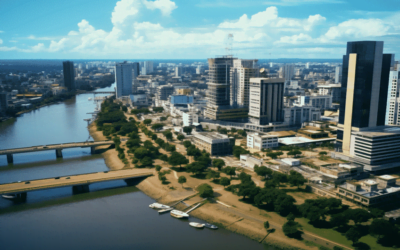Hey there, fellow drone enthusiasts! Are you ready to explore the captivating world of Belgium’s Drone Laws? I totally get the excitement and curiosity that led you to this search. As drone aficionados, we’re constantly eager to fly higher, capture breathtaking footage, and explore the skies. But the last thing you want is to run into legal turbulence when flying your drone in Belgium, right?
Well, my friend, I’ve got some fantastic news for you. I’ve dived deep into the intricacies of Belgium’s drone regulations, and I’m here to share my findings with you.
I’ve scoured official documents, consulted experts, and even exchanged stories with fellow drone enthusiasts who’ve ventured into Belgian airspace. I can’t wait to spill the beans and provide you with a comprehensive guide to navigating Belgium’s drone laws like a pro.
So, here’s the deal: If you’re searching for answers, wondering about the dos and don’ts of flying a drone in Belgium, or simply craving some expert insights, you’re in the right place. I’m here to be your guide through the labyrinth of Belgium’s drone laws.
Just keep reading, and together, we’ll ensure your drone flights in Belgium are not only thrilling but also fully compliant with the law. Let’s embark on this journey to uncover all the essential details you need to know about Belgium’s drone laws.
- Agencies Responsible for Regulating Drones in Belgium
- General Rules for Flying a Drone Within the European Union
- General Rules and Licensing Requirements for Flying a Drone in Belgium
- Hobbyist Drone Laws
- Commercial Drone Laws
- Drone Laws for Visitors to Belgium
- Drone Laws for Government Drone Operators
- Belgium’s Drone Categories and Operational Requirements
- Special Considerations for Travelers
- Additional Guidelines and Considerations
- Final Thoughts on Belgium Drone Laws Review
- Frequently Asked Question Drone Laws in Belgium
Agencies Responsible for Regulating Drones in Belgium

Now, let’s embark on a journey to uncover the key players in the realm of Belgium’s drone regulations. Think of it as meeting the guardians of the airspace, the ones who ensure safe and responsible drone operations. So, who are these watchful authorities, and what roles do they play in shaping Belgium’s drone laws?
Meet the Gatekeepers
Picture this: just like a well-organized event with its meticulous planners, drone operations in Belgium have their orchestrators. Two main agencies stand at the forefront – the Federal Public Service Mobility & Transport (FPS) and the European Union Aviation Safety Agency (EASA).
The Role of FPS and EASA
FPS is the Belgian authority that keeps a watchful eye on drone activities. It’s like the event organizer who checks that everything runs smoothly, making sure all pilots follow the rules and ensuring safety above all. They’re responsible for implementing and supervising Belgium’s drone rules.
EASA, on the other hand, is like the overarching committee that oversees all events across Europe. They set the guidelines and ensure that Belgium aligns with European Union drone regulations. In essence, they bring uniformity to the drone rules that all EU countries follow.
Together, FPS and EASA form a tag team that strives to create a safe and regulated environment for drone enthusiasts like us. It’s like they’re the referees on the field, making sure everyone plays by the rules and the game remains exciting yet safe.
Also Read: Afghanistan Drone Laws 2024
General Rules for Flying a Drone Within the European Union

Now, let’s venture into the intriguing territory of drone rules within the European Union. Just like different regions have their own unique flavors, the EU has its set of regulations, and Belgium plays its part in the symphony. So, how do these regulations work, and what categories do they place drones in?
Aligning with EASA
Think of EASA as the master chef, whipping up a recipe for drone safety that all EU countries can savor. Belgium dances to this tune as well, adhering to the European Union Aviation Safety Agency (EASA) regulations. It’s like following a global culinary standard – a common set of rules that ensures that no matter where you fly your drone in the EU, you know what to expect.
The Three Categories
Now, let’s break down these rules further. Imagine drones as cars on the road, and each category is like a different class of vehicle. In the EU, drones are categorized into three main groups: Open, Specific, and Certified.
It’s somewhat akin to cars being divided into sedans, SUVs, and race cars, each with its specific rules and limitations. Depending on your drone’s characteristics and your intended operation, you’ll fall into one of these categories.
The Regulatory Framework
So, what’s the deal with this regulatory framework? Well, think of it as the traffic rules of the sky. It ensures safe, responsible, and organized drone operations within the EU.
Much like traffic lights and speed limits on the road, these rules are in place to keep the drone-filled skies orderly and secure. Whether you’re flying for fun or work, understanding this framework is crucial to navigating the European drone landscape smoothly.
Also Read: Andorra Drone Laws 2024
General Rules and Licensing Requirements for Flying a Drone in Belgium

Alright, let’s dive into the nitty-gritty of drone rules in Belgium. Here, we’re like explorers uncovering hidden treasures, except our treasure is knowledge about how to fly our drones legally and safely. So, what’s the deal with the rules in Belgium?
No General Set of Rules?
Belgium takes a unique approach to drone regulations. Unlike some countries that have a single set of rules, Belgium splits its regulations into three distinct classes of operations. It’s as if they’ve created different lanes on the road for various types of vehicles, ensuring that the right rules apply to the right circumstances.
The Three Classes of Operations
Alright, picture this: you’re picking a vehicle to take on a journey. In Belgium, that journey is your drone flight. The three classes—Class 1a, Class 1b, and Class 2—are like different cars, each with its own specific abilities and restrictions.
Depending on your choice, you’ll need the right license to operate. Think of it as needing a specific driver’s license for a motorcycle versus a heavy truck. It’s all about finding the perfect match for your intended operation.
The Fine Print
So, you’re all set to hit the skies with your drone. But wait, there’s some fine print. Like a road trip checklist, Belgium has a set of provisions you must follow. You must undergo pilot training, register your drone, keep up with maintenance, secure insurance coverage, and always respect data protection laws.
It’s similar to having your vehicle in perfect condition, ensuring you’re well-insured, and respecting privacy when you hit the road. These are the essential components of a safe and lawful drone flight in Belgium.
Also Read: Bangladesh Drone Laws 2024
Hobbyist Drone Laws

Now, let’s talk about hobbyist drone laws in Belgium. Imagine this part as your guidebook to flying drones for fun. We’re about to delve into the thrilling world of recreational drone flights and the rules that come with it. So, what do hobbyists need to know?
The Hobbyist Regulations
Hobbyist drone flights are absolutely allowed in Belgium. It’s like having your own mini-airshow in the sky. However, just like any show, there are some rules to follow. You can’t just zoom around anywhere without a care in the world. The Belgian Civil Aviation Authority expects hobbyist pilots to play by the rules and maintain safety in the sky.
The Pilot’s License Requirement
Now, here’s the deal – if you’re a hobbyist, you’re not off the hook when it comes to licenses. It’s somewhat akin to needing a driver’s license to take your car on the open road. Hobbyists also need a Belgian drone pilot license to ensure they’re familiar with the rules and safety measures. Don’t worry; it’s not as daunting as it may sound, and it’s all about ensuring safe flights.
Registering Your Drone
Now, let’s talk about registration. If your drone weighs more than 250 grams or comes equipped with a camera, it’s like needing a license plate for your vehicle. You have to register for it. The process is relatively straightforward, and it ensures that authorities can trace the drone back to its owner if needed. It’s all about accountability in the world of drones.
No Need for Remote ID
Unlike some countries, Belgium doesn’t require hobbyist drones to have remote identification (remote ID). It’s like not needing a visible license plate on your vehicle. While it’s not mandatory, it’s still a great practice to ensure accountability and safety.
Drone Insurance – A Wise Choice
Now, drone insurance isn’t something you must have, but it’s a smart move. Think of it as having insurance for your car – it’s not a legal requirement, but it can save you a lot of headaches in case of an accident. So, while not mandatory, it’s strongly recommended for hobbyists.
Also Read: Bahrain Drone Laws 2024
Commercial Drone Laws

Alright, let’s shift gears and get into the commercial drone laws of Belgium. It’s like moving from a hobbyist’s playground to a more professional arena. If you’re considering using your drone for business purposes, there are some important rules you need to know. So, what’s in store for commercial drone operators?
Flying Commercial Drones
First things first, yes, you can fly drones for commercial purposes in Belgium. It’s like turning your hobby into a business venture, but with a few more rules to follow. Whether you’re into aerial photography, surveying land, or any other business venture involving drones, Belgium opens up its skies for you.
The Pilot License Requirement
Now, let’s talk about licenses. Just like you’d need a commercial driver’s license for a delivery job, commercial drone operators require a Belgium drone pilot license. It’s a way to ensure those using drones for business are well-versed in the rules and safety measures. While it might sound like a hassle, it’s all in the name of ensuring safe and professional drone operations.
Registering Your Commercial Drone
When you’re flying drones for business, there’s another task on your checklist – drone registration. It’s like getting your business license before setting up shop.
By registering your drone, you’re making sure that the authorities can trace it back to you, adding an extra layer of accountability to your commercial drone operations. It’s all about playing by the rules and making sure your business soars smoothly in the Belgian skies.
No Remote ID Required
One interesting aspect is that commercial drone operators in Belgium don’t need to bother with remote identification (remote ID). It’s somewhat akin to a business vehicle not needing an extra sticker to identify itself; the focus is on safety and accountability, and remote ID isn’t a mandatory part of the equation.
It’s all about ensuring that your commercial drone ventures can take flight without unnecessary complexities.
The Importance of Drone Insurance
While drone insurance isn’t mandatory for hobbyists, it’s a whole different story for commercial operators. It’s like the commercial insurance you’d need for your store or vehicles—a crucial safety net. So, yes, it’s required for commercial drone operations in Belgium.
It might feel like an additional expense, but think of it as protection in case something goes wrong during your business endeavors in the sky. Safety first, always.
Also Read: Belarus Drone Laws 2024
Drone Laws for Visitors to Belgium

Now, let’s talk about drone laws in Belgium for those who are just visiting. It’s like knowing the rules of the road in a foreign country before you rent a car. Visitors, whether here for tourism or business, might be curious about flying drones in this beautiful European nation.
Permission for Foreign Visitors
The good news is that foreign visitors can absolutely fly drones in Belgium. It’s like being welcomed to join a local event even though you’re from out of town. Belgium opens up its skies to tourists and business travelers alike, allowing them to enjoy the drone-flying experience.
Foreign Visitor Drone Pilot License
However, there’s a catch. To take to the Belgian skies with your drone, you need a foreign visitor drone pilot license. It’s somewhat akin to needing a visitor’s pass to enter a restricted area. This requirement is in place to ensure that those operating drones, even temporarily, are familiar with the local regulations and safety measures. It’s all about responsible and safe flying.
Drone Registration for Visitors
Just like everyone else, visitors are required to register their drones in Belgium unless they’re already registered with the European Union Aviation Safety Agency (EASA). It’s like making sure you have the right documents when you cross international borders.
This registration process ensures accountability and traceability if needed, providing a safe and responsible drone-flying environment for visitors in Belgium.
No Remote ID for Tourists
Here’s some good news for tourists – you don’t need to worry about remote identification (remote ID). It’s like a welcoming gesture from Belgium, ensuring that your drone flying experience is less complicated.
While it might not be mandatory, always consider using a remote ID as an extra layer of safety, just like putting on sunscreen before a day at the beach.
The Suggestion of Drone Insurance
Belgium doesn’t mandate drone insurance for tourist operations, but it’s a smart move to consider it. It’s similar to having travel insurance when you’re exploring a new place – you hope you won’t need it, but it’s reassuring to have.
While it’s not a must, drone insurance can provide peace of mind during your visit, especially if you’re flying valuable equipment. It’s always better to be safe than sorry.
Also Read: Barbados Drone Laws 2024
Drone Laws for Government Drone Operators

Now, let’s shift our focus to government drone operations in Belgium. Much like in any country, the government has its set of rules and regulations to ensure the safe and responsible use of drones.
Allowances for Government Drone Flights
Belgium allows government agencies to take to the skies with drones. It’s akin to a law enforcement agency using helicopters for surveillance or disaster management agencies using drones for search and rescue missions. The key here is ensuring these operations are in line with safety and security standards.
Government Drone Pilot License
Just like commercial operators, government agencies need to have licensed drone pilots at the helm. It’s similar to how police officers need to have the right certifications and training to operate certain vehicles or equipment. This requirement ensures that government drone operators are well-versed in the specific regulations and safety measures applicable to their operations.
Drone Registration for Government Operations
Government drone operations also require registration. It’s like ensuring that the license plate of a government vehicle is clearly visible. Registration adds an extra layer of accountability and transparency to government drone activities, contributing to safer and more responsible drone usage.
No Remote ID for Government Operations
Interestingly, government drone operations in Belgium are exempt from the requirement of remote identification (Remote ID). It’s somewhat akin to government vehicles not necessarily needing license plates for identification. This exemption streamlines government drone activities while maintaining strict safety and security protocols.
No Mandate for Drone Insurance
When it comes to government drone operations, Belgium doesn’t require drone insurance. This stands in contrast to some commercial and hobbyist regulations, but it makes sense.
Government agencies often have extensive resources and budgets to cover any potential mishaps, similar to how government vehicles are insured under a separate system.
So, for government drone operators, insurance isn’t a mandatory aspect, yet safety remains a top priority.
Also Read: The Bahamas Drone Laws 2024
Belgium’s Drone Categories and Operational Requirements

Belgium’s drone regulations are structured into three operational categories, each designed to ensure safe and responsible drone operations. Let’s delve into the specifics of these categories and understand what they mean for drone enthusiasts and operators.
Exploring the Three Operational Categories
Belgium’s drone regulations classify drone operations into three categories: Open, Specific, and Certified. These categories are like different lanes on a highway, each with its own set of rules and requirements. The choice of category depends on factors like the drone’s weight, the altitude it will fly at, and the safety measures in place.
Criteria for Each Category
In the Open Category, drones must have a maximum take-off mass of less than 25 kg (55 lbs) and should be operated within a visual line of sight at a maximum altitude of 120m. Safety is paramount, as the remote pilot must keep the drone at a safe distance from people and avoid direct operation over crowds.
There are also specific subcategories within the Open Category, known as A1, A2, and A3, each with its own set of rules and requirements. These subcategories help tailor regulations to the level of risk associated with different drone operations.
Subcategories in the Open Category
The open category is further divided into three subcategories: A1, A2, and A3. Think of these as variations within the same lane on the drone regulation highway.
A1 allows drones to fly over people but not over gatherings, while A2 permits flights closer to people, and A3 focuses on flights farther away from people.
Adhering to the relevant subcategory’s requirements ensures safe and responsible drone operations, promoting the enjoyment of this exciting hobby while prioritizing safety above all else.
Also Read: Azerbaijan Drone Laws 2024
Special Considerations for Travelers

If you’re a drone enthusiast planning to visit Belgium and want to take your drone along, there are some important considerations to keep in mind. Understanding the rules and regulations for travelers can make your drone experience in Belgium a smooth and enjoyable one.
Specific Considerations for Travelers
Belgium’s drone laws extend a warm welcome to travelers who wish to explore its skies. However, there are certain specific considerations you should be aware of.
First and foremost, if you plan to fly your drone in Belgium, you’ll need to register it in the Belgian aviation register. This is a mandatory step to ensure that your drone complies with the country’s regulations.
Drone Registration in the Belgian Aviation Register
Drone registration is a straightforward process. You can easily register your drone, and it’s a critical step in ensuring the safety and accountability of drone flights. Once registered, your drone is recognized as a part of the Belgian airspace, and you can enjoy flying it while adhering to the local rules.
Exemption from Re-Registration
For travelers who have already registered their drones in their home countries, there’s a piece of good news. Belgium recognizes these registrations, meaning you won’t have to go through the process of re-registering your drone when you arrive.
This exemption simplifies the process for international drone enthusiasts and promotes a hassle-free experience.
Contact Information for Inquiries
Should you have any inquiries or need additional information about traveling with your drone in Belgium, the Belgian Civil Aviation Authority (BCAA) is your go-to source.
They can provide guidance, clarification, and any updates you might need for a seamless drone experience during your visit. Be sure to reach out to them for any assistance or information you may require.
Also Read: Austria Drone Laws 2024
Additional Guidelines and Considerations

When exploring the world of drone flight in Belgium, it’s essential to not only understand the legal framework but also to embrace responsible and ethical practices. Here are some additional guidelines and considerations to keep in mind for a safe and enjoyable drone experience.
Compliance with Data Protection and Privacy Laws
One of the critical aspects of responsible drone operation is respecting privacy and data protection laws. It’s important to remember that drones equipped with cameras can capture sensitive information and potentially infringe on individuals’ privacy.
Always ensure that you are complying with relevant data protection regulations and respect people’s privacy by avoiding any intrusive or unauthorized filming.
Stay Away from Airports, Restricted Airspace, and No-Fly Zones
To maintain safety and prevent disruptions, it’s crucial to steer clear of airports, restricted airspace, and designated no-fly zones. These areas have specific rules and regulations in place to protect manned aviation and ensure public safety. Ignoring these restrictions could lead to accidents or legal consequences, so it’s best to adhere to them.
Prohibition of Completely Autonomous Aircraft
Belgium’s regulations emphasize the importance of maintaining control over your drone. Completely autonomous aircraft, which operate without human intervention, are strictly prohibited.
This rule is in place to ensure that drone operators are present to make real-time decisions, enhancing safety and accountability during flights. Always maintain control over your drone and never deploy fully autonomous systems to stay in line with the regulations.
Also Read: Australia Drone Laws 2024
Final Thoughts on Belgium Drone Laws Review

As we near the conclusion of our journey through Belgium’s drone laws, let’s take a moment to recap the essential aspects of operating drones in this picturesque European country.
In the world of drone flight, responsibility is key. Whether you’re a hobbyist or a commercial operator, it’s crucial to understand that flying drones in Belgium comes with certain rules and regulations.
By adhering to these guidelines, you not only ensure your safety and that of others but also contribute to the positive image of drone enthusiasts. Responsible operation includes respecting privacy, obeying no-fly zones, and always maintaining control over your drone.
Drone regulations can evolve over time, just like the technology itself. To stay in compliance and make the most of your drone experience, it’s a good practice to stay updated with the latest rules and guidelines.
Regulations may change to adapt to new challenges and technologies, so consulting the relevant authorities and keeping an eye on official announcements is essential. The Federal Public Service Mobility & Transport (FPS) and the European Union Aviation Safety Agency (EASA) are valuable sources for updates.
Frequently Asked Question Drone Laws in Belgium
1: Are drones allowed in Belgium, and what are the categories of drone operations?
Yes, drones are allowed in Belgium. Drone operations in Belgium are categorized into three categories based on the level of risk involved: open, specific, and certified.
The Open category, with the lowest risk, allows drone flights without prior authorization or declaration for drones under 25kg, operated within a visual line of sight at a maximum altitude of 120m.
The specific category involves moderate risk and requires authorization, considering operational risk assessment. The Certified category is for high-risk operations, including drones designed to carry people.
2: Do I need a license to fly a drone in Belgium as a hobbyist?
Yes, if you’re a hobbyist flying a drone in Belgium, you need a Belgium drone pilot license. Hobbyist drone flights are permitted, but obtaining this license is mandatory. It’s part of the regulatory framework in place to ensure safe and responsible drone operations
3: Do I need to register my drone in Belgium for hobbyist use?
Drone registration is required in Belgium for hobbyists, particularly for drones that exceed 250g in weight or those equipped with cameras. This registration process ensures that the authorities can trace and manage the drone’s operation while adhering to regulations.
4: Is drone insurance mandatory for hobbyists in Belgium?
Drone insurance is not a mandatory requirement for hobbyists in Belgium. However, it is highly recommended.
Insurance provides peace of mind and financial protection in case of accidents or incidents during your drone flights. While not required, it’s a responsible choice for hobbyist drone operators.
5: What rules should I follow when flying a drone in Belgium’s ‘Open’ category?
In the ‘Open’ category, you can fly your drone without prior authorization, provided that your drone weighs less than 25kg and operates within a visual line of sight at a maximum altitude of 120m.
Specific subcategories within the ‘Open’ category, A1, A2, and A3, have varying requirements related to proximity to people. If you meet the subcategory requirements, no operational authorization is required.
Additionally, your drone operator needs to be registered, your drone must be within a visual line of sight, flown at a maximum altitude of 120 meters, and not carry any dangerous goods or drop materials during flight.













